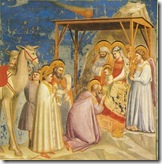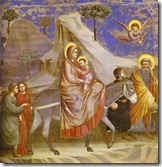Attending a course at Windsor in October, there were encounters with all sorts of things that don’t come up in the average Church of Ireland parish. The music was at a different level, with composers’ names I had never heard. Discussions of the arts were in a language beyond me.


Attending a funeral of a working-class young man who had died in tragic circumstances, I sat at the back and watched his many friends. They took no part whatsoever in the service, they stood and looked impassive, no words and no expressions; what was happening simply did not engage with them. It might just as well have been a lecture on art for all the meaning it had. The only time they looked interested was when members of the young man’s family spoke, here was something they could understand.
Christmas is about God coming down to ordinary people. The church seems to have spent much of the time since then taking God away from ordinary people. Giotto might have more credibility in some circles if he had been a Juventus player, but at least he can be understood.
Bishop Edwin Owen, the saintly man who taught preaching to Church of Ireland clergy twenty years ago, used to make us ask four basic questions:
Can I be seen?
Can I be heard?
Can I be understood?
Do I have a message of hope?
We cannot talk about hope this Christmas if no-one understands us.